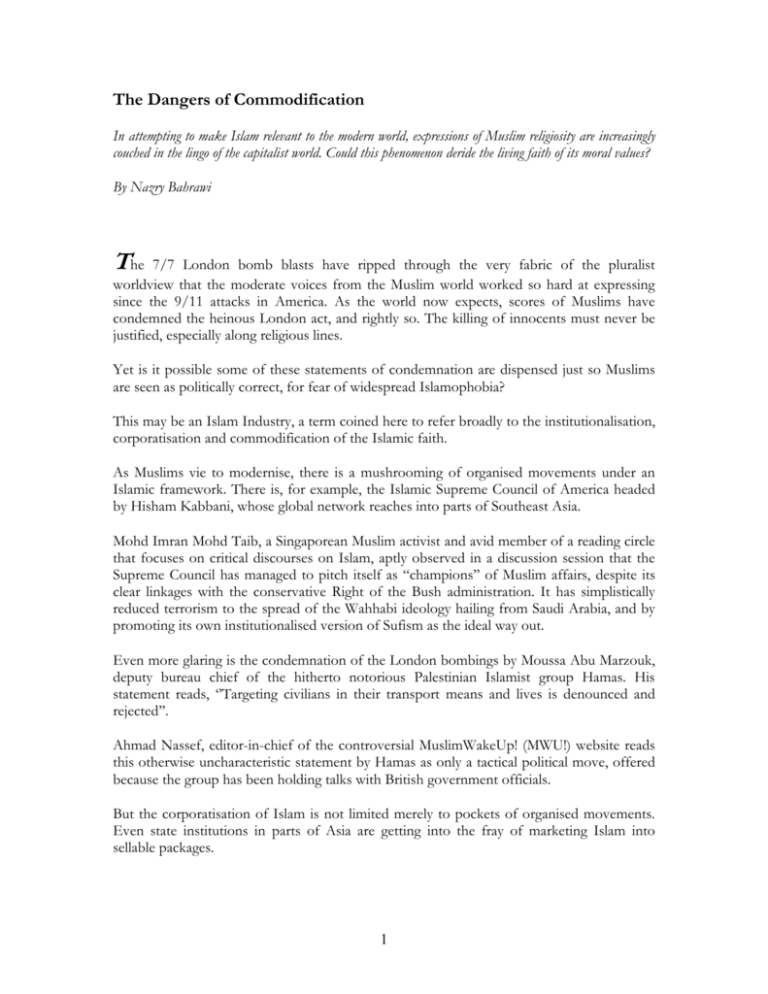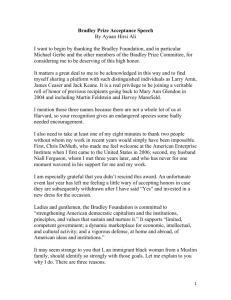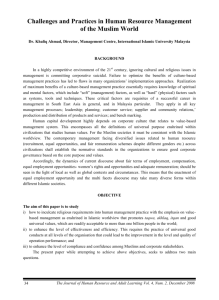The Dangers of Commodification
advertisement

The Dangers of Commodification In attempting to make Islam relevant to the modern world, expressions of Muslim religiosity are increasingly couched in the lingo of the capitalist world. Could this phenomenon deride the living faith of its moral values? By Nazry Bahrawi The 7/7 London bomb blasts have ripped through the very fabric of the pluralist worldview that the moderate voices from the Muslim world worked so hard at expressing since the 9/11 attacks in America. As the world now expects, scores of Muslims have condemned the heinous London act, and rightly so. The killing of innocents must never be justified, especially along religious lines. Yet is it possible some of these statements of condemnation are dispensed just so Muslims are seen as politically correct, for fear of widespread Islamophobia? This may be an Islam Industry, a term coined here to refer broadly to the institutionalisation, corporatisation and commodification of the Islamic faith. As Muslims vie to modernise, there is a mushrooming of organised movements under an Islamic framework. There is, for example, the Islamic Supreme Council of America headed by Hisham Kabbani, whose global network reaches into parts of Southeast Asia. Mohd Imran Mohd Taib, a Singaporean Muslim activist and avid member of a reading circle that focuses on critical discourses on Islam, aptly observed in a discussion session that the Supreme Council has managed to pitch itself as “champions’’ of Muslim affairs, despite its clear linkages with the conservative Right of the Bush administration. It has simplistically reduced terrorism to the spread of the Wahhabi ideology hailing from Saudi Arabia, and by promoting its own institutionalised version of Sufism as the ideal way out. Even more glaring is the condemnation of the London bombings by Moussa Abu Marzouk, deputy bureau chief of the hitherto notorious Palestinian Islamist group Hamas. His statement reads, ‘’Targeting civilians in their transport means and lives is denounced and rejected’’. Ahmad Nassef, editor-in-chief of the controversial MuslimWakeUp! (MWU!) website reads this otherwise uncharacteristic statement by Hamas as only a tactical political move, offered because the group has been holding talks with British government officials. But the corporatisation of Islam is not limited merely to pockets of organised movements. Even state institutions in parts of Asia are getting into the fray of marketing Islam into sellable packages. 1 One clear example comes from Malaysia, where the ruling UMNO party has conceptualised the notion of Islam Hadhari. The concept originated as an antithesis to the brand of Islam offered by the exclusively religious opposition party Pas during the 2004 national election. It has developed into an arguably credible worldview that comes complete with 10 underlying principles written by a team of academics. In a similar move, members of the Singapore Muslim community are encouraged to conform to 10 desirable attributes of a progressive Muslim. It is all based on a framework conceptualised by the Islamic Religious Council of Singapore, known as MUIS, the Lion City’s official religious governing body. In Pakistan, President Pervez Musharraf has developed yet another faith-based package which he has sold as ‘’moderate enlightenment’’. It bids to promote an Islamic worldview that departs from extremism. Across the Muslim world, the commodification of the Islamic faith is best seen in the spread of Islamic banking. Touted to be a multi-billion business, its potential for profits are too tantalising for nations to ignore. It is little wonder that economic-savvy Singapore plans to become a player, exploring ways where Islamic banking can be institutionalised within its larger financial framework. In a rare move, religion and finance are now married, as experts from both fields of the island state consider how to work closely with their counterpart across the Causeway. Malaysia has a solid foothold as the de facto Islamic banking centre in the Malayan archipelago. As faith gains currency in parts of Southeast Asia, Islamic banking backers would do well to heed the advice of Australia-based Islamic scholar Abdullah Saeed, who maintains that the principles of economic justice – a value inherent within the Islamic faith – must be upheld. In a session with policy-makers and academics at Singapore earlier this year, Dr. Saeed outlined this ideal as the original intent of the pioneers of the Islamic banking movement. Lately, there are dubious packages which pragmatists have developed over recent times, packages that have been criticised as preying on the dollars of the faithful and not borne out of the sincerity of establishing a just alternative financial system free of interest and usury. Given that even the Organisation of Islamic Conference (OIC) is vying to economically empower Muslim nations through closer economic ties, it is perhaps inevitable in today’s capitalist world that religion gets commodified. However, recent arrests of religious leaders in Indonesia on corruption charges must serve as a cautionary warning to Muslims against such temptations, as the Islam Industry develops. 2 It also is prudent for Muslims to pause to examine the ideas from the likes of US-based academic Abdullahi An-Na’im, who argues that the Shariah (Muslim law) as a moralising force should reside within the individual hearts and minds and not as an institutionalised form. Muslims then could stand a greater chance of not becoming victims of wayward ideologies propagated by powerbrokers in organised religious movements. Perhaps London could even have celebrated the success of its 2012 Olympic campaign in relative peace. ***** [This article was first published in Bangkok Post, 20 July 20, 2005.] 3









